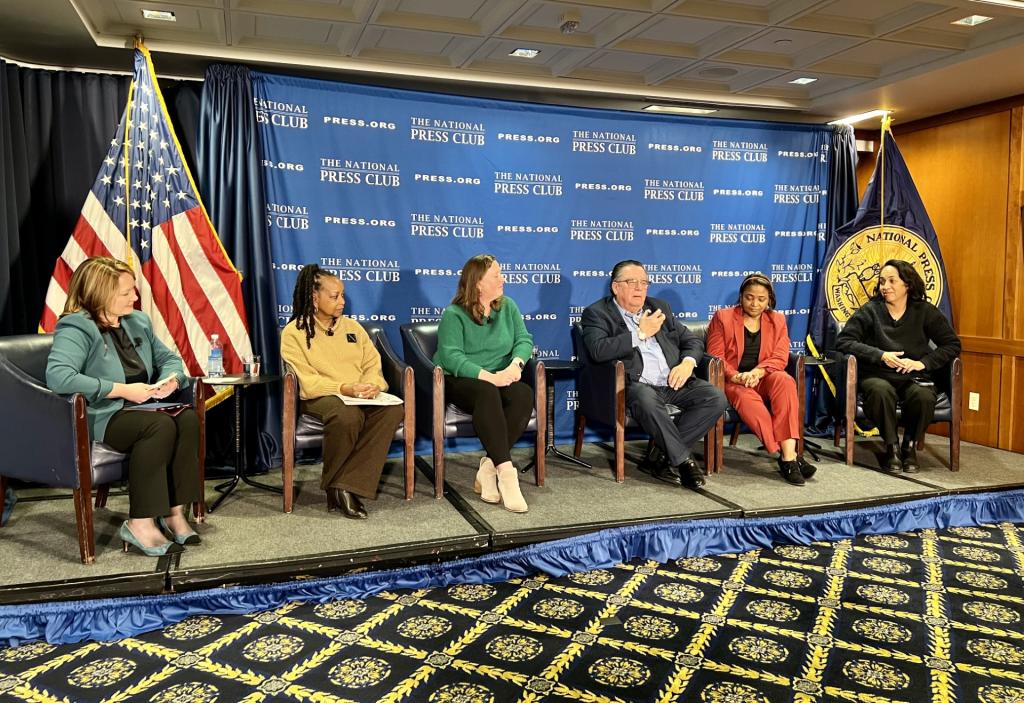News outlets covering underrepresented communities help irrigate news desert
News organizations that focus on underrepresented communities are helping tell their stories, which can be ignored by mainstream news outlets, panelists said at a Dec. 14 National Press Club event.
Lori Montenegro, Noticias Telemundo’s Washington bureau chief, said her Spanish-speaking network has become a key conduit for reporting on local events for Comcast partner NBC.
NBC, she said, now constantly reaches out to Telemundo asking the network if it is covering a story and providing video and interviews so that the national network can “explain it a little more” and air a more in-depth report.
"Before,” she said, “you wouldn't even find a network executive … who would even dare put a local reporter on a network newscast, because there's that stigma of, you know, ‘What's the way that they look? How do they speak? Do they even know how to hold the microphone?' We've gotten past that now."

Montenegro was one of the panelists who spoke about news deserts for communities and underrepresented groups at a discussion moderated by Club President Eileen O’Reilly. The event was the second of three the Club is hosting about the lack of news outlets in many parts of the country. The last session is scheduled for 6 p.m., Wednesday, Jan. 17. Registration required.
The growth of news deserts threatens not just the journalism profession but also democracy. People in news deserts do not have access to the information they need to make informed decisions; leaders tend not to be held accountable for their actions; and people can more easily live in a bubble and be inundated with misinformation.
In addition to Montenegro, the Dec. 14 panel featured Terri Rupar, political editor at The 19th, a nonprofit news site focused on gender, politics and policy; Geraldine Moriba, senior vice president and chief content officer at the Grio, the largest Black newsroom in the nation covering social justice, socio-economic, lifestyle, politics, and entertainment; Denise Rolark Barnes, publisher and second-generation owner of The Washington Informer, copies of which are available in the Club members area; and Levi Rickert, publisher and editor of Native News Online and Tribal Business News and a member of the Prairie Band Potawatomi Nation. View the livestream recording online. View the livestream recording of the event.
Rickert said tribes across the United States typically have their own publications to keep members informed. Collectively, however, he said is there is very little coverage of Native Americans.
And that coverage tends often paints a negative picture of the Native American community, he said. He cited a survey by the Native American Journalists Association that shows a year’s coverage of communities focused on how most of them “had to deal with poverty, alcoholism and just the negative side – the dark side of who we are as a Native people.”
“It’s time for Native Americans to tell our own story,” he said. "I just feel, really, as an independent news source out there in Indian country, that I can contribute. … I see my audience as being more than just Native Americans. We have to constantly educate."
Rickert said that his publication often receives calls from legislators, which gives him hope that "we are finally getting the attention of a lot of important people." He said he's optimistic about the future for journalism in his community.
"We kept Native American News online going on a shoestring for a long time,” he said. “The tide has turned -- we're still not where I want it to be. … But what gives me hope is the recognition we get. Even being here tonight is very meaningful to me. Eileen called me and said, hey, she reads Native News Online, I said, 'let me pinch myself.' The National Press Club called."
Montenegro, a recipient of the Congressional Hispanic Caucus Institute’s Latina Leader Award and a 2023 inductee into the National Association of Hispanic Journalists Hall of Fame, said the Covid pandemic played a key role for news networks in rethinking local news coverage.
Covid helped open people's minds “on how we need to deliver the news,” Montenegro said. “During Covid, one of the neglected communities was the farm workers. We [the public] were all hiding in our homes, but nobody was thinking about -- how is it that you're getting to the grocery store and you're still finding produce there?”
Because the networks don’t specifically have reporters covering vast agricultural areas of the nation, Telemundo had to depend on the few local reporters who were “still going out in the fields,” she said.
